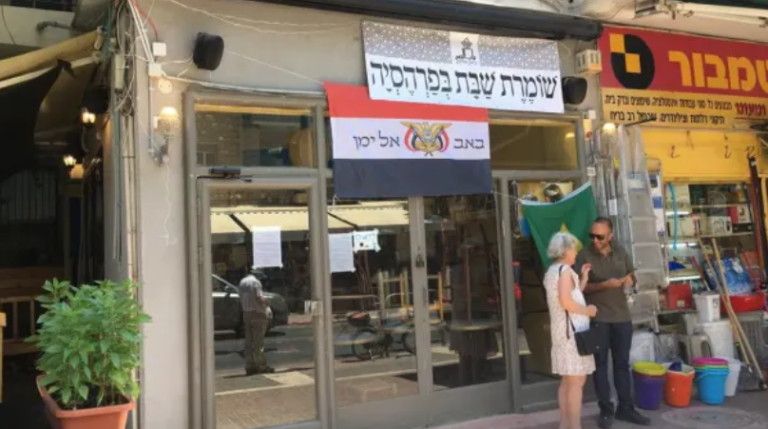The Chief Rabbinate of Israel Council has summoned the owner of the Bab al-Yemen restaurant, located at 29 Aza Street in Jerusalem, to speak to him regarding his effort to become certified by the Rabbanut despite opening on Shabbos.
YWN-Israel reported a few weeks ago that the restaurant owner, Yehonatan Wadai, is leading the battle to permit restaurants to be certified by a local rabbinate while opening on Shabbos, using pre-paid vouchers for payment, citing hotels are open on Shabbos and yet they are certified by the local rabbinates. Due to mounting public pressure, Wadai was summoned by the council to discuss the matter, despite the council originally refusing his request outright.
Wadi said, “I hope this is a first ground-breaking step towards the restaurant receiving [kashrus] certification similar to the kashrus given to hotels, which operate on Shabbos. I call on the Rabbinate to do the correct thing”.
Wadi has already filed a petition in his case with the High Court of Justice, backed by the Ne’emanei Torah V’Avodah organization, seeking to have the High Court compel the Chief Rabbinate of Israel to explain why it refuses to give kashrus certification to a restaurant working on Shabbos, following the model of hotels which enjoy such certification, yet operate on Shabbos.
The restaurant today serves kosher food and is open on Shabbos, with Wadi explaining there is no Chilul Shabbos as the food is prepared in advance and heated on electric hotplates and payment is made before or after Shabbos, as is the case in hotels nationwide.
“The fact that the Rabbinate refuses to grant kashrus certification to the restaurant is surprising and illogical” explains Wadi, the owner of the Bab al-Yemen restaurant. He maintains that if hotels can operate this way and receive kashrus certification, there is no reason he cannot do the same.
Tani Frank, who is the head of the Religion & State Department for the Torah V’Avodah organization comments, “The Chief Rabbinate should be interested in strengthening the restaurants that serve kosher food and are not Mechalel Shabbos. Such a process will increase the number of kosher restaurants and permit the religious public to have family and community meals while strengthening small local businesses. We are very hopeful that the Rabbinate will act to bring people together and examine the matter impartially and allow Bab al-Yemen and other restaurants to open their doors without Chilul Shabbos with strict adherence to kashrus”.
(YWN Israel Desk – Jerusalem)












3 Responses
It makes too much sense so probably will never be approved. The Rabanut will come up with some convoluted explaination as to why hotels are different even though they and the restaurant use the identical procedures regarding food preparation, payments etc.
Russ and Daughters at the Jewish Museum in Manhattan does this
The Rabbanut Harashit is, as the name implied, in charge of YIDDISHKEIT in Eretz Hakodesh. (The Lubavitcher Rebbe [Zatzal, in case it matters to anyone] didn’t want his chassidim to take positions in the Rabbanut, *one* of the reasons being that they would be compelled beyond their will–kivyachol–to do things that are hefech Shulchan Aruch, for example allocating funds to churches and the like…)
As such, it is their duty to do what is necessary according to the laws of YIDDISHKEIT and not according to the logic of an average store owner who has no knowledge of halacha. The opening of a restaurant on Shabbos even in the most muttar manner is problematic for several reasons, the most basic of which are that it will cause Yidden to be mechalel Shabbos more as a result — how do you write down who owns money after Shabbos? How will you prevent someone from certainly not heating food or doing any of a thousand melachos (av and otherwise) “accidentally”? Or how about the fact that people will *drive* their on Shabbos etc etc.?
And even then it is ridiculous to have a discussion about what technicalities are involved, when after all we are talking about an *esek that is open on Shabbos*?! I would assume that the same people arguing for this to happen, would similarly argue that there is no problem leaving a TV open from before Shabbos (and then the question becomes why they have a TV lekatchila but that is an entirely different question).
As regards hotel restaurants being open on Shabbos, I plead ignorance on the matter, but I hope that the Rabbanut does have its reasons for leaving them open, if they do indeed operate as restaurants in terms of an esek. Perhaps the solution is not to open other’s, but to close hotel restaurants?
And at any rate, in case a political (and not a religious) solution is needed in this situation, I might suggest that hotel restaurants be viewed as a form of pikuach nefesh (similar to why rabbanim often are mattir to visit gas station stores in Israel, which are open on Shabbos, because they serve as a sort of pikuach nefesh—and this gufa is similar to the heter of using electricity in Israel on Shabbos, because of hospitals vedai lameivin).
In a hotel, there might be no other option for food other than the given restaurant, and thus as a general rule they have an outstanding reason to allow them.